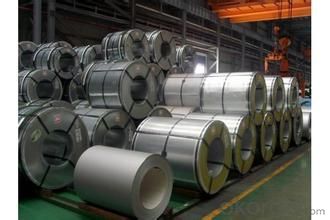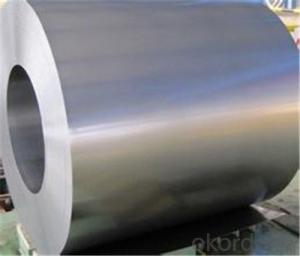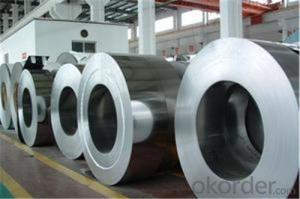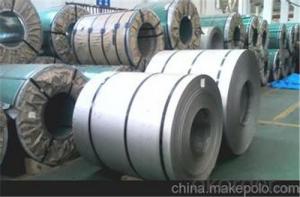Cold Galvanized/ Auzinc Steel -SGCC in China from CNBM
- Loading Port:
- Tianjin
- Payment Terms:
- TT OR LC
- Min Order Qty:
- 150 m.t.
- Supply Capability:
- 5000000 m.t./month
OKorder Service Pledge
OKorder Financial Service
You Might Also Like
Description:
Hot-dip aluzinc steel sheet is substrated on cold rolled steel (CRC) in various strength and specification. Coating composition is 55% aluminum in weight ratio, 43.4% zinc, and 1.5% silicon, with excellent corrosion and heat resistance performance.
Specifications:
1.Mateials:SGCC,DX51D / DX52D /S250,280GD
2.Size:width:600-1250mm(900mm,1215mm,1250mm,1000mm the most common)
thickness:0.15-2.0mm
length:1000-6000mm,as your require
3.Zinc coating :60-180g( as required)
4.Coil id:508mm
5.Coil weight: 3-5MT(as required)
6. Surface:regular/mini/zero spangle, chromated, skin pass, dry etc.
Applications:
Galvalume Coil widely used for roofing products, It is also the ideal base material for Prepainted Steel Coil.
1. roofing
2. gutters
3. unexposed automotive parts
4. appliances
5. furniture
6. outdoor cabinetry
Images:

Production of cold formed corrugated sheets and profiles for roofing, cladding, decking, tiles, sandwich walls, rainwater protective systems, air conditioning duct as well as electrical appliances and engineering.
FAQ
1.What's your MOQ?
50MT, it is for one container.
2.Whether your company have QC teams?
Yeah, sure, our QC team is very important, they will keep the quality control for our products.
3. What's your normal delivery time?
Our delivery time about 10-20days for standard sizes, if you have other requirements like hardness and width ,it is about 20-40days. But don't worry ,we also try our best for the
- Q:What are the different types of steel coil slitting blades?
- Different types of steel coil slitting blades are available to suit specific applications and materials. The following are some commonly used types: 1. Circular slitting blades: These blades, which are circular in shape, are widely used for slitting steel coils. They have a sharp edge that cuts through the coil as it rotates. The choice of material for circular slitting blades, such as high-speed steel or tungsten carbide, depends on the desired cutting performance and durability. 2. Arbors: Arbors are cylindrical blades used in conjunction with circular slitting blades. They hold the circular blade in place, allowing for precise and consistent slitting of the coil. 3. Shear slitting blades: These blades are used for cutting thicker and harder materials like stainless steel or aluminum. They have a straight edge and work by shearing the material apart, rather than cutting through it like circular blades. Shear slitting blades are typically made from high-quality tool steel to withstand the high forces involved in cutting thicker materials. 4. Crush cut slitting blades: Crush cut blades are suitable for slitting softer materials like paper or plastic. They have a blunt edge that crushes and tears the material instead of cutting it cleanly. Crush cut blades are often made from materials like carbon steel or hardened stainless steel. 5. Razor slitting blades: Razor slitting blades are ideal for slitting delicate materials that require a clean and precise cut, such as thin films or foils. They have an extremely sharp edge that slices through the material without causing any damage or distortion. Razor slitting blades are typically made from high-quality stainless steel or tungsten carbide. Choosing the right type of steel coil slitting blade is crucial and depends on factors such as the specific application, material, and desired cutting performance. The blade selection significantly affects the quality and efficiency of the slitting process.
- Q:How are steel coils used in automotive manufacturing?
- Steel coils are used in automotive manufacturing to produce various components and parts such as body panels, chassis, doors, and other structural parts. The coils are processed through different techniques like cutting, stamping, and welding to shape them into the desired form. This allows for the production of strong and durable automotive parts, ensuring the safety and reliability of vehicles.
- Q:I need to know which cookware set is better. We are trying to get rid of the ones we have here. They are Teflon. I have heard that stainless steel (aluminum) and hard Ionized are good, but which is the best one.
- A good quality stainless steel cookware set is a necessity- it is virtually indestructible and you can use the harshest of scrubbers to clean it. You will need a basic set that has a 8 and 12 fry pan/omelet pan, a large pot that holds a minimum of 4 quarts, and 2 sauce pots at 1 quart and 2 1/2 quart sizes. I have several pieces of hard anodized cookware too- they do a wonderful job but food will still stick. A must is at least one Green Pan- preferably a 10-12 fry pan. They are truly non-stick, clean up is a breeze and making foods like fried eggs is infinitely easier when they slide out of the pan without breaking. They do not have the same issues that plague teflon pans- scrapes and shedding that you are ultimately consuming. You can easily find them online and at your area Target store.
- Q:I am buying a knife for my future husband for his wedding gift and I was wondering what is better carbon steel or stainless steel?
- The better grade of stainless is the top choice, but it can be hard to find, and expensive. - Surgical scalpels are made of it. (Common '420' stainless will not hold an edge as well as high carbon steel.)
- Q:How are steel coils used in the production of metal shelving?
- Steel coils play a vital role in manufacturing metal shelving. Made from high-quality steel, these coils go through a series of manufacturing processes to transform them into sturdy and long-lasting shelves. To start, the steel coils are unwound and flattened to the desired thickness using a machine known as a slitter. This step ensures that the coils are uniform in size and thickness, which is crucial for producing consistent and dependable shelves. Next, the flattened steel is cut into specific lengths using a shear. These pieces are then sent to a press brake, where they are bent and shaped into the desired design for the shelves. The press brake applies pressure to the metal, allowing it to be folded or formed into various angles and shapes, such as shelves with raised edges or adjustable brackets. Once the shelves have been formed, they undergo a welding process to securely fuse any joints or seams. This welding process ensures the shelves' structural integrity, enabling them to support heavy loads and maintain their shape over time. After welding, the shelves go through surface treatment to improve their appearance and protect them from corrosion. This may involve cleaning, sandblasting, and painting. The surface treatment not only enhances the shelves' aesthetic appeal but also extends their lifespan by preventing rust and other forms of deterioration. Lastly, the shelves undergo a quality control inspection to ensure they meet the necessary standards. This involves checking for defects, measuring dimensions, and conducting load-bearing tests to ensure the shelves can withstand the intended weight capacity. In summary, steel coils are integral to the production of metal shelving. Through processes like unwinding, flattening, cutting, bending, welding, treating, and inspecting, these coils are transformed into strong, durable, and visually pleasing shelves suitable for various settings such as warehouses, retail stores, and homes.
- Q:Can steel coils be coated with anti-tampering materials?
- Yes, steel coils can be coated with anti-tampering materials. These coatings are designed to enhance security measures and deter any unauthorized access, tampering, or theft of the steel coils.
- Q:what is the refining process doing to raw materials in steel
- As Mr. Perfessor says, refining raw steel involves a lot of purifications of the raw steel; and to expand a bit, these refining processes also add corrosion-resistances to certain graded steels, and durability factors, when heat-tempering processes are used. All of these refining processes, and coating processes help steel products last when exposed to moistures, salts, and other corrosive conditions that steel can be exposed to, whether the steel is in open-air/water/space, embedded in concretes and other masonry products, or part of a protective barrier system in power plants, engines, etc. Hope this also helps; the eggster.
- Q:This is my first time buying new strings for my violin and I’ve narrowed it down to two choice based on reviews and cost. The only difference I can see between the strings is that one has a solid steel core and the other has a synthetic core. What are the pros and cons of each type of core?
- Play okorder /
- Q:Whats the difference in composition? When LTCS is used generally?Whats the temperature range, that these materials can be used? Is there any relation between Killed carbon steel, LTCS, stainless steel, carbon steel(normal)? How to categorise/classify these?Thankyou very much in advance..
- Low Temperature Carbon Steel
- Q:Can steel coils be recycled?
- Yes, steel coils can be recycled. Steel is a highly recyclable material, and steel coils can be melted down and reformed into new steel products without losing their quality or strength. Recycling steel coils helps to conserve natural resources, reduce energy consumption, and minimize waste.
1. Manufacturer Overview |
|
|---|---|
| Location | |
| Year Established | |
| Annual Output Value | |
| Main Markets | |
| Company Certifications | |
2. Manufacturer Certificates |
|
|---|---|
| a) Certification Name | |
| Range | |
| Reference | |
| Validity Period | |
3. Manufacturer Capability |
|
|---|---|
| a)Trade Capacity | |
| Nearest Port | |
| Export Percentage | |
| No.of Employees in Trade Department | |
| Language Spoken: | |
| b)Factory Information | |
| Factory Size: | |
| No. of Production Lines | |
| Contract Manufacturing | |
| Product Price Range | |
Send your message to us
Cold Galvanized/ Auzinc Steel -SGCC in China from CNBM
- Loading Port:
- Tianjin
- Payment Terms:
- TT OR LC
- Min Order Qty:
- 150 m.t.
- Supply Capability:
- 5000000 m.t./month
OKorder Service Pledge
OKorder Financial Service
Similar products
New products
Hot products
Related keywords




























